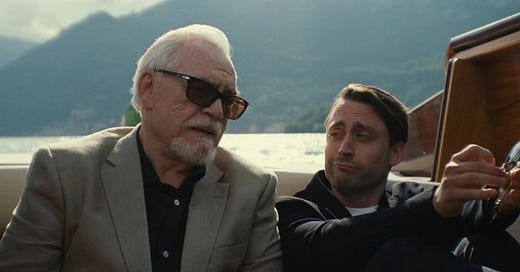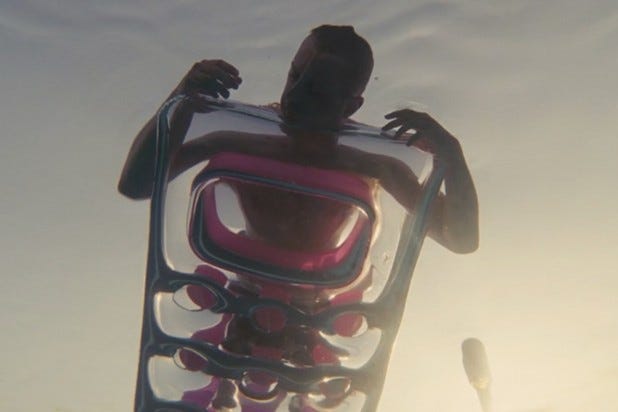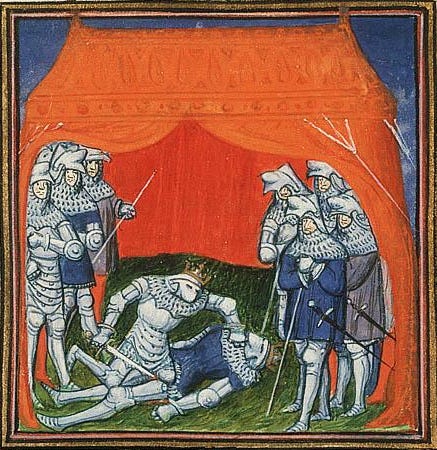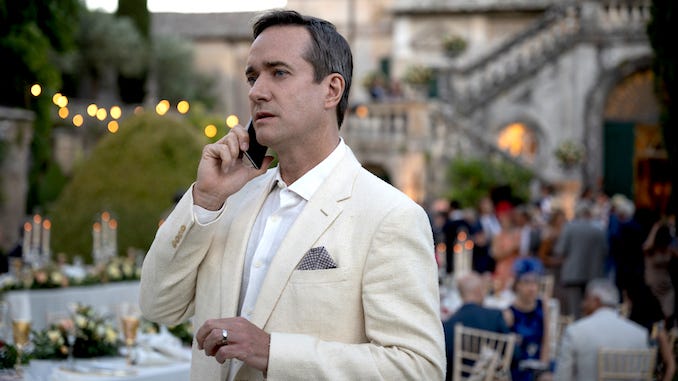If you would like to support my writing, please like this piece, share it, Tweet about it, subscribe, or even just send this piece to a friend.
WARNING: Packed with Succession spoilers.
So, it’s over. And the patriarch remains king. His children distraught, having pleaded in desperation to a daddy who will always fuck over whoever, whenever it suits him, even if it’s his own children—defeated by a man who lies not only for personal gain but without consequence. He walks out the door and a chorus of questions follow; the trio abandoned by a father for whom love is just a word for a bond that hasn’t been broken yet, even as the world continues to turn around him. The lasting lesson of the finale of season 3 of Succession is: without Logan Roy the world is nothing.
It had all been so hopeful just some fifteen minutes earlier. No longer willing to stand in the shadow of a giant, in union or temporary truce, Shiv, Roman and Kendall enter the halls of power to face down their Voldemort daddy. Could this finally be the moment the top-dog gets toppled? Are Daphne, Shaggy and Scrappy Doo actually going to run the company together? The writers get straight to the crude heart of the show: “Hey dad,” Kendall shouts . . . at a locked door at the end of a corridor, not knowing behind which of the doors one of the most powerful men in the world (who also happens to be his father) sits. Next, dozens of suits mill about with paper briefs, “Have you seen my dad, Logan Roy?” Roman quizzes anyone who’ll listen. But Logan isn’t in with the suits and the busy bodies, he’s past the door with the security guard. Power isn’t in the war room, it’s behind it. And when the children try and kill daddy, they buckle. He’s one step ahead: “I win,” he bellows at them before his grand exeunt.
The end of season 2 was a masterful piece of writing, finishing with a mind-bendingly unexpected powerplay. Kendall creeped along in depression all season until pouncing, a butterfly of braggadocio emerging from his Xanax-cocoon. A friend, Zander, who works in TV told me the trick to plotting is writing something completely unexpected that you also always knew was going to happen. And I was in awe at the plotting of the first two seasons, wondering how it was possible to keep so many arcs open while close together. The strength and balance of the second season assured the show’s place in the canon of fine-crafted televisual sagas alongside Sopranos and The Wire.
But the third season has been hackneyed, and Monday’s finale was perhaps the worst episode of them all. It was less the dramatic tension of ‘Silvio driving Adriana to the woods’ and more the lowest common denominator mood of climax: ‘Harry Potter stumbling around the forbidden forest.’ The writing was predictable, too on the nose, forcing each character back to a point of origin from which they can never escape. The whole episode is littered with examples: “Shiv, I’m not here,” Kendall shrivels into a ball, rocking his head back and forth before confessing to his secret crime to his two siblings. Roman and Shiv can only joke about how they, too, have both killed a kid. “I’m bad,” Kendall has to assert, as if anyone in the show could be other than bad. But is it funny or sad? In this case, sad.
In the climax of the last ten minutes, Logan tries to cut out Shiv and Kendall, and bring Roman on side to the Madsen deal: “You can trust me,” he implores to his beloved Romulus, Darth Vader trying to sway his perverted Luke Skywalker son over to the dark side. “You can’t trust him,” Shiv retorts as Kendall simply shakes his head from side to side to re-enforce the point. Watching it I was so taken aback by the pantomime-like lack of subtlety. The casing ripped off, staring at the bare machinery, I was the child who has just discovered that magic isn’t real.
I’ll admit, I’ve found season 3 patchy at best. One might say it lacked direction, but the truth is it only had one route to travel, sacrificing the intricacies of plotting that made season 2 especially magisterial for a much narrower world.
What happened to Marsha? Why has Tom been so easily let off the hook for his corporate crimes? Why did Kendall give up the fight so easily? Is Roman’s only motivation to impress his father? What does Shiv actually do anymore? But with all these examples of directions the show has failed to take, the many problems with season 3 hinge on one crucial point: the incapacity to resolve the premise and move on from it. It’s becoming a huge impediment to the show. If you kill the king, then where do you take the story?
There are undoubtedly some great moments in season 3, ones that gave viewers reminders about what had made the show so brilliant. The Kendall birthday episode was pretty funny. But the highlight for me was episode 4 with Adrien Brody playing beanied-billionaire Josh Aaronson entertaining Kendall and Logan with a beachside lunch. As the major shareholder tried to heal the rift that was majorly devaluating his asset, it brought the irreconcilable bad feelings between Kendall and Logan to the centre of the show. It allowed the strength of each character to chime as they clashed in silent angst.
In the lunching with Aaronson episode the writing was canny because it gave space for each character to stand apart. More importantly, we could sniff blood; the physical weakness of Logan Roy was the dramatic arc that held season 1 together. As Logan wheezes in the rushes, looking close to a heart attack, Kendall’s physical superiority is a sword hanging above the father’s neck, even when both are forced to pretend to Aaronson that Logan’s completely fine to maintain the value of their stock. We are reminded that Kendall could really be the guy. It’s brilliant because we know the king could fall.
That was where the season dipped for me. In a particularly confusing episode that followed, a strange comedy of errors built through unclear ‘business’ drama (the near-entirety of which took place in what looked like an airport waiting room), lip-service was paid to Logan’s declining health with the piss-mad incident. But after that he was stronger than ever before, no threats to his health or his position. By the end of the season his children are all out of ideas about how to kill the father, devoid of any characteristics beyond their subservience to him, terrified that the ubermensch is thinking about freezing his sperm. All the children can be is infantilised.
The primary flaw with Succession is that, while the mechanics of plot intricately spin out from the premise—who will succeed the king—each move linked to this destiny, the king piece can never be relinquished. Actual story is foreclosed because the workings of the show’s mechanics can never push any character toward any progression that might amount to a fundamental change. Shiv betrayed by her husband, Romulus toppled by a dick pic, and Kendall distraught by his drowned kid albatross. None of them any closer to power. No development, no transformation, no real crises, no meaningful change: “just the repetition of a fundamental Oedipal order,” as my flatmate Vijay put it (he hasn’t seen the show). Nothing changes. Things have to stay exactly as they are.
I have some sympathy for the writers because it’s an extremely compelling premise. Furthermore, Succession is obviously a hard show to write because of the difficult place it occupies between comedy and drama. And for the most part it nails its tone very successfully. But, at this stage of the show there’s a clear nervousness on the writing team to take the leap of faith required for the development of story proper—instead we are left with the unsatisfying feeling of repetition and overfamiliarity (like a bad relationship, or a sitcom you’ve grown to hate). Let’s say for example that the writers decide to kill off Logan, to cut the head off the king and replace him with one of his inadequate progeny. To twist the knife in would open the story up. But it would also cut down the central pivot from which each of the plot strings tautly hang. The change would be severe. But perhaps it’s necessary?
Across the show there are flashes of how a character could be greater than what they are. At the end of season 2, Kendall is no longer his father’s lapdog, changed from a broken shadow of a man. What a shame then that the show can only punish him at the expense of his father (I don’t think the better show would be one where Kendall rises all the way to victory, it’s more the immovability of the king piece that so frustrates me). And, sipping wine in some swim shorts on board a yacht, Cousin Greg’s development of taste in season 2 marks the distance he’s travelled since vomiting through the eyeholes of a giant squirrel costume. But he ends season 3 an under-utilised character. Similarly, Connor Roy’s desire for the presidency, when lent brief consideration by his father speaks to an underdeveloped character. And there’s little space in the show for his life away from the family bosom—much the same could be said of the diminishing wholeness of Shiv now she no longer seeks her own career in politics.
“Everything’s boring isn’t it?” Logan says to the Scandinavian tech-billionaire Matsson, who we don’t yet know will buy the company. “Yeah, everything is pretty fucking boring.” And so goes the transfer of power, from a man for whom feelings are just the visible tick of a flaw that hasn’t destroyed you yet, to a man who is extremely excited about nothing and ever so slightly pleased that computers do stuff that make him money. But neither of these characters can be the site of our emotional investment. While everyone is bad, the bad-bad man are really bad, the show tells us.
Perhaps the third series tucks all of Logan’s children too firmly in the rocking cradle, too close to the black hole at the centre of the plot--the family tie that can never be severed, all the boughs creaking in the wind. But, storytellers, if you hold your child characters as children forever, then what way can story spring? One might even argue that the writers know this, the season-finale setting up the perfect springboard to cut the mini-Roys loose. As Shiv says: “Time to rip off the band-aid?”







